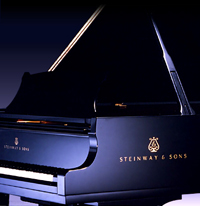
Angels, Demons, and Pianos
Making the rounds of the movie houses at the moment is an exquisite jewel of a flick called 'Note by Note: The Making of Steinway L1037', in which the entire gestation of a Steinway concert grand is traced from moist northern forests to Steinway's showroom floor. The creation of a fine piano is a precise combination of timeless craft and the heavy-lifting might of the Industrial Revolution. Look at a high-class piano, and you see the perfect union of technology and art.
 Playing the piano was my main gig for a significant slice of my musical career, nor have I yet retired my oh-so-trained chops out to stud. My schooling was as a performer; it says so, right there on my degrees. I've played on a lot of pianos in my day, and like all pianists, I've acquired some discernment as to what makes one piano an angel and another a demon, and what makes most of them, alas, monotonous boxes with all the personality of a toaster oven. Ignoring the difference between cheap and fine pianos, or between well-maintained or practically-disintegrating instruments, we are still left with the fact that of two pianos both costing $100K+, one instrument may behave as a joyful messenger of song while the other makes like Freddy Krueger. The higher-end the piano, the more pronounced individual personalities among instruments become. You can count on a certain generalized temperament with middle-of-the-road makes, but when it comes to the big boys — the two Steinways (American and German), Bösendorfer, Bechstein, Fazioli — no two are alike.
Playing the piano was my main gig for a significant slice of my musical career, nor have I yet retired my oh-so-trained chops out to stud. My schooling was as a performer; it says so, right there on my degrees. I've played on a lot of pianos in my day, and like all pianists, I've acquired some discernment as to what makes one piano an angel and another a demon, and what makes most of them, alas, monotonous boxes with all the personality of a toaster oven. Ignoring the difference between cheap and fine pianos, or between well-maintained or practically-disintegrating instruments, we are still left with the fact that of two pianos both costing $100K+, one instrument may behave as a joyful messenger of song while the other makes like Freddy Krueger. The higher-end the piano, the more pronounced individual personalities among instruments become. You can count on a certain generalized temperament with middle-of-the-road makes, but when it comes to the big boys — the two Steinways (American and German), Bösendorfer, Bechstein, Fazioli — no two are alike.
 I know my own reactions pretty well, so I decided to ask another pianist about his feelings as to good and bad pianos. As luck would have it, I was lunching with one of my former students, the very much up-and-coming young pianist Julio Elizalde; having graduated from the SF Conservatory, he's currently in the doctoral program at Juilliard and is pianist with the prizewinning N-E-W Trio. Over the clink and hustle of the Zuni Café, Julio told me that of all the pianos he's played this last year, only two really stood out as being angelic. Both were German Steinways — that is, made at the Steinway plant in Hamburg, which produces a distinctly different instrument from the American variety made in New York. He was able to describe what made those pianos special: "With some pianos you feel like you're hanging on top of the keys, because you're afraid of creating an ugly sound, but this one you could just play loud and big and it was a rich piano that could handle it."
I know my own reactions pretty well, so I decided to ask another pianist about his feelings as to good and bad pianos. As luck would have it, I was lunching with one of my former students, the very much up-and-coming young pianist Julio Elizalde; having graduated from the SF Conservatory, he's currently in the doctoral program at Juilliard and is pianist with the prizewinning N-E-W Trio. Over the clink and hustle of the Zuni Café, Julio told me that of all the pianos he's played this last year, only two really stood out as being angelic. Both were German Steinways — that is, made at the Steinway plant in Hamburg, which produces a distinctly different instrument from the American variety made in New York. He was able to describe what made those pianos special: "With some pianos you feel like you're hanging on top of the keys, because you're afraid of creating an ugly sound, but this one you could just play loud and big and it was a rich piano that could handle it."
 We also had a discussion about demon instruments — those pianos of good pedigree that are just horrid nonetheless. I have nightmarish memories of a Bechstein that used to skulk around in Hellman Hall, at the SF Conservatory's former building out on Ortega Street. The piano looked great on paper — a new Bechstein concert grand — so a lot of pianists chose it for their concerts sight unseen. Choosing that Bechstein turned out to about as wise as Hitler choosing to invade Russia: the thing was the spawn of Satan; clanking, clattering, creaking, sullen, heavy, uneven, and just downright nasty. It could chop off a pianist's legs in about two seconds flat, sucking up every attempt at musicality and spitting it back with pitiless rancor.
We also had a discussion about demon instruments — those pianos of good pedigree that are just horrid nonetheless. I have nightmarish memories of a Bechstein that used to skulk around in Hellman Hall, at the SF Conservatory's former building out on Ortega Street. The piano looked great on paper — a new Bechstein concert grand — so a lot of pianists chose it for their concerts sight unseen. Choosing that Bechstein turned out to about as wise as Hitler choosing to invade Russia: the thing was the spawn of Satan; clanking, clattering, creaking, sullen, heavy, uneven, and just downright nasty. It could chop off a pianist's legs in about two seconds flat, sucking up every attempt at musicality and spitting it back with pitiless rancor.
Julio was able to match my Bechstein From Hell by telling me of a vile Bösendorfer that, having been maladroitly transgendered into a faux-Steinway, was reversed-engineered back into a tragically disfigured Bösendorfer. A severe identity crisis was the result and the instrument, caged at Bösendorfer Hall in New York, has been declared a man eater by the pianistic villagers. Apparently it is painted blue (!!), possibly as a public safety precaution.
The moral: never buy a piano in the dark, and don't assume that just because it costs the GNP of a small developing nation that it's ipso facto a great instrument.
.jpg)
